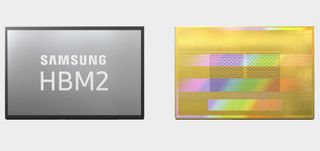Samsung’s new HBM2E memory paves the way for 64GB graphics cards
It could also potentially lower the cost of HBM2.

Samsung introduced its new high bandwidth memory (HBM2E) product at Nvidia's GPU Technology Conference (GTC) this week, with claims that it is 33 percent faster than the previous generation HBM2. Just as importantly, it's a denser solution that, in theory, could enable the best graphics cards with much larger memory buffers than what is typically available today.
Called "Flashbolt," Samsung says its HBM2E memory can hit 3.2 gigabits per second (Gbps) per pin. It has a density of 16 gigabits (Gb) per die, which is double the capacity of the previous generation, and comes in stacks of eight. That adds up to a 16 gigabyte (GB) package. At 3.2Gbps on a 1,024-bit bus, a single package offers up to 410GB/s of memory bandwidth.
Where things get interesting is when crunching the numbers on a bigger scale. As our friends at AnandTech point out, by using four Flashbolt packages with a processor on a 4,096-bit memory bus, we're looking at 64GB of memory with 1.64TB/s of peak bandwidth.
To put that into perspective, AMD's recently launched Radeon VII sports 16GB of HBM2 memory with 1TB/s of memory bandwidth. That comes by way of using four memory stacks, rather than a single stack like Flashbolt affords.
"Flashbolt’s industry-leading performance will enable enhanced solutions for next-generation datacenters, artificial intelligence, machine learning, and graphics applications," said Jinman Han, senior vice president of Memory Product Planning and Application Engineering Team at Samsung Electronics. "We will continue to expand our premium DRAM offering, and improve our ‘high-performance, high capacity, and low power’ memory segment to meet market demand."
In other words, graphics cards are fair game, though the more immediate market will likely be professional accelerators rather than consumer solutions for gaming. Still, this stuff has to start somewhere, and it's not unusual for bleeding edge technology to debut in servers and datacenters before trickling into the consumer space.
The downside, of course, is price. HBM2 is comparatively expensive to GDDR5/6. Offering a denser solution could conceivably push down HBM2 pricing in general, but it's not as though GDDR memory is suddenly going to disappear.
PC Gamer Newsletter
Sign up to get the best content of the week, and great gaming deals, as picked by the editors.
Samsung did not say when it will begin mass producing HBM2E.
Paul has been playing PC games and raking his knuckles on computer hardware since the Commodore 64. He does not have any tattoos, but thinks it would be cool to get one that reads LOAD"*",8,1. In his off time, he rides motorcycles and wrestles alligators (only one of those is true).
Most Popular









